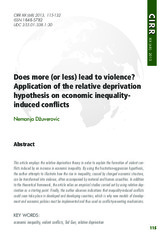Приказ основних података о документу
Does more (or less) lead to violence? Application of the relative deprivation hypothesis on economic inequality-induced conflicts
| dc.creator | Džuverović, Nemanja | |
| dc.date.accessioned | 2021-04-02T12:04:45Z | |
| dc.date.available | 2021-04-02T12:04:45Z | |
| dc.date.issued | 2013 | |
| dc.identifier.issn | 1848-5782 | |
| dc.identifier.uri | http://rfpn.fpn.bg.ac.rs/handle/123456789/405 | |
| dc.description.abstract | This article employs the relative deprivation theory in order to explain the formation of violent conflicts induced by an increase in economic inequality. By using the frustration-aggression hypothesis, the author attempts to illustrate how the rise in inequality, caused by changed economic structure, can be transformed into violence, often accompanied by material and human casualties. In addition to the theoretical framework, the article relies on empirical studies carried out by using relative deprivation as a starting point. Finally, the author observes indications that inequality-induced conflicts could soon take place in developed and developing countries, which is why new models of development and economic policies must be implemented and thus used as conflict-preventing mechanisms. | en |
| dc.publisher | Walter de Gruyter GmbH | |
| dc.rights | openAccess | |
| dc.rights.uri | https://creativecommons.org/licenses/by-nc-nd/4.0/ | |
| dc.source | Croatian International Relations Review | |
| dc.subject | Economic inequality | en |
| dc.subject | Relative deprivation | en |
| dc.subject | Ted Gurr | en |
| dc.subject | Violent conflicts | en |
| dc.title | Does more (or less) lead to violence? Application of the relative deprivation hypothesis on economic inequality-induced conflicts | en |
| dc.type | article | |
| dc.rights.license | BY-NC-ND | |
| dc.citation.epage | 72 | |
| dc.citation.issue | 68 | |
| dc.citation.other | 19(68): 53-72 | |
| dc.citation.spage | 53 | |
| dc.citation.volume | 19 | |
| dc.identifier.doi | 10.2478/cirr-2013-0003 | |
| dc.identifier.fulltext | http://rfpn.fpn.bg.ac.rs/bitstream/id/248/402.pdf | |
| dc.identifier.scopus | 2-s2.0-85032713120 | |
| dc.type.version | publishedVersion |

